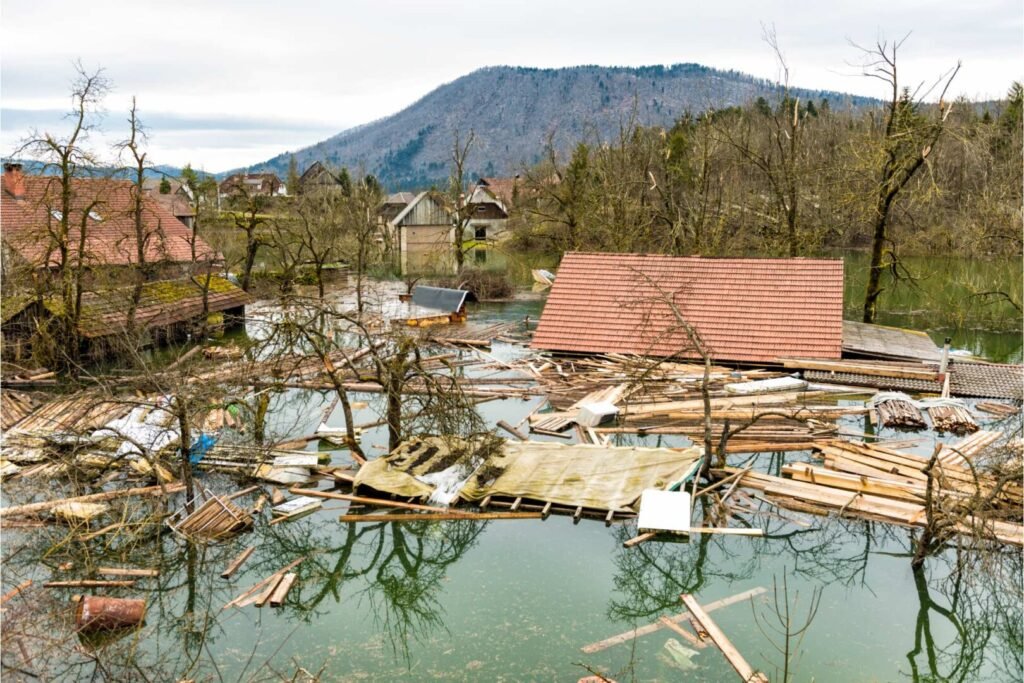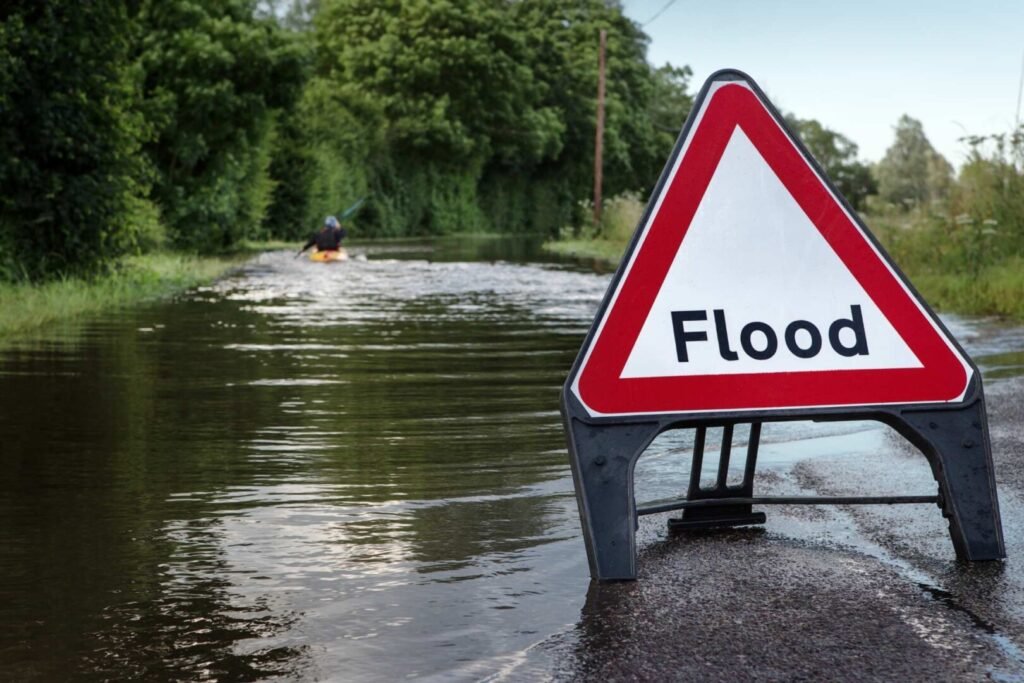Dubai, the vibrant desert metropolis renowned for its lavishness and cutting-edge architecture, was unexpectedly thrust into turmoil by an unprecedented natural phenomenon: relentless downpours that inundated its streets, highways, and even its airports. This extraordinary event, characterized by heavy rainfall, led to extensive flooding and widespread chaos throughout the city. Amidst the eventual return of the sun, tales of individuals trapped in their vehicles, pandemonium reigning at airport terminals, and the profound implications of this disaster on Dubai’s flood in 2024 began to emerge, painting a vivid picture of the city’s ordeal.
Dubai’s Flood in 2024: Understanding the Causes and Consequences
On April 16, 2024, Dubai encountered a historic weather phenomenon that left the bustling desert city grappling with an unprecedented deluge. Uncharacteristically heavy rainfall, measuring up to 259.5mm (10.2 inches), inundated the typically arid landscape of the United Arab Emirates (UAE), surpassing all records since the commencement of data collection in 1949.
The aftermath of this massive storm was serious. Heavy rain caused many problems throughout the area. Streets turned into swiftly flowing rivers, buildings flooded, and many people were unable to leave their homes. Extreme weather events are uncommon in Dubai, so this was a surprise to everyone there. It disrupted the normal way of life there.
Even though it appeared to be just one big event at first, meteorologists are investigating a variety of possible causes for the heavy rain. They claim this is due to the rarity with which certain unusual weather patterns coincide. This produced a large number of clouds, causing the rain to fall for an extended period. All of these different weather events occurred at the same time, causing the rain to fall heavily and quickly on Dubai.
Climate change is an important issue to consider. While we cannot say for certain whether this particular storm was caused by climate change, it is possible. Climate change refers to how the world’s weather is changing as a result of human activity. Overall, the world is getting hotter, and the weather is becoming more unusual. So, even if we do not know what to expect from this storm, it serves as a reminder that we must prepare for more extreme weather in the future.
Dubai’s Infrastructure Struggles in the Face of Unprecedented Flooding
Dubai found itself unprepared for the massive amount of rain it received. The city’s drainage systems couldn’t handle it, causing roads and highways to become submerged under water. People were stuck in their cars, workplaces, and even airports. Air travel was severely affected, with passengers facing long delays and confusion.
Before 2024, Dubai had never seen flooding as bad as this. Its dry climate and desert terrain made heavy rain seem unlikely. Because of this, the city hadn’t put much focus on preparing for floods. Instead, investments were made in other areas. But when the unexpected happened, Dubai was left vulnerable and struggling to deal with the consequences.
The Multifaceted Impact of Dubai’s Flood in 2024

The repercussions of the disaster extended far beyond the immediate aftermath, impacting various aspects of life in Dubai.
Economic disruption was among the foremost consequences of the floods. Dubai’s economy heavily depends on tourism, trade, and aviation. The inundation disrupted flights, leaving passengers stranded and affecting businesses reliant on air travel. The financial losses incurred were substantial, with many sectors experiencing setbacks and challenges in recovering from the disruption.
Moreover, the damage to infrastructure was widespread and severe. Roads, buildings, and public spaces bore the brunt of the flooding, sustaining significant damage. The costs associated with repairing and restoring the infrastructure were considerable, further straining resources and delaying recovery efforts.
The human toll of the disaster was also profound, although no official death toll was reported in Dubai itself. However, neighboring Oman, which was also affected by the same storm, tragically lost 19 lives. Beyond the loss of life, the emotional impact on individuals affected by the floods cannot be quantified. The trauma and distress experienced by those caught amid the disaster underscored the profound human cost of such calamities.
Business Impact and Adaptation Strategies in the Wake of Flooding in Dubai
During the floods, numerous businesses in Dubai encountered disruptions as offices, retail stores, and warehouses were inundated, resulting in temporary closures. The loss of revenue due to interrupted operations and damaged inventory poses a threat to the financial stability of these businesses.
As a significant logistics hub, Dubai experienced disruptions in its supply chains during the floods. Roads, ports, and airports were affected, causing delays in shipments. Businesses relying on timely imports or exports may have faced challenges as a result.
The tourism industry in Dubai took a hit as flights were delayed or canceled, affecting both inbound and outbound travelers. Hotels, restaurants, and entertainment venues witnessed cancellations and a decrease in footfall.
Businesses with physical infrastructure such as factories, warehouses, and retail spaces suffered damage during the floods. Repairs and renovations are expected to be costly. Additionally, the impact on utilities like water, electricity, and telecommunications could further disrupt business operations.
Businesses affected by the floods are likely to file insurance claims, potentially leading to increased payouts for insurance companies. Premiums for property and business interruption insurance may rise in the aftermath.
The disaster underscored the importance of robust business continuity plans. Companies are now inclined to invest in disaster preparedness and risk mitigation, with remote work arrangements and backup facilities becoming more common.
Dubai’s image as a resilient and business-friendly city may face scrutiny in the wake of the disaster. Investors and multinational corporations may evaluate the city’s ability to handle such crises. Transparent communication from local authorities and businesses will be essential to maintaining investor confidence.
Some businesses may innovate in response to the floods, developing new technologies for flood-resistant infrastructure and emergency response. Startups and entrepreneurs may find opportunities to address climate-related challenges.
The UAE government’s response will impact businesses, potentially offering relief packages, tax incentives, and grants to affected sectors. The government’s commitment to infrastructure improvements will also influence business prospects.
Building Resilience: Dubai’s Response to the Flood Disaster

The impact of the Dubai flood extends far beyond the city’s borders, serving as a poignant reminder for urban centers worldwide. As climate change continues to accelerate, cities must brace themselves for more frequent and severe weather events. The lessons gleaned from Dubai’s harrowing experience hold invaluable insights for global efforts to combat climate change and foster climate-resilient communities.
In the wake of the disaster, Dubai must prioritize resilience and sustainability in its planning and development endeavors. Investments in robust infrastructure, effective disaster preparedness measures, and proactive climate adaptation strategies will be paramount to safeguarding the city’s future. By assimilating the lessons learned from this calamity and taking decisive action, Dubai has the opportunity to emerge from the rubble stronger and more resilient than ever before.
Dubai’s flood in 2024 was a stark reminder that even the most advanced cities can face nature’s wrath. As the UAE continues to develop, it must prioritize climate resilience to prevent such tragedies in the future. The desert city learned a hard lesson: no place is immune to extreme weather events.

